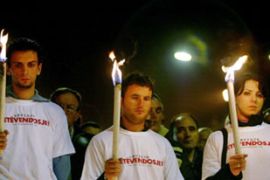UN official fired for Kosovo deaths
Provincial minister also resigns, taking “moral responsibility” for police action.

Published On 14 Feb 2007
The demonstrators were killed by police rubber bullets.
At the time Curtis said police had been compelled to take “defensive measures” when protesters tried to force their way through barricades around parliament in Pristina, Kosovo’s capital.
Fatmir Rexhepi, Kosovo’s first interior minister, also resigned from his position on Monday saying he felt “moral responsibility” for the deaths.
|
“I have asked the police commissioner, Stephen Curtis, to resign from his post with immediate effect” Joachim Ruecker, |
Agim Ceku, Kosovo’s prime minister, said police had used “excessive force” and called for an independent investigation.
The two ethnic Albanian men aged 30 and 34 were confirmed dead on Sunday after Kosovo’s worst clashes since March 2004, when 19 people died in anti-Serb protests.
Sunday’s protest was against a UN plan for Kosovo. A large proportion of the population in the Serbian province want autonomy and demonstrators said the plan does not go far enough towards granting independence.
About 3,000 people – many carrying banners reading “No negotiation. Self-determination” – took part in Sunday’s protests.
Many are concerned there could be widespread civil unrest if a decision on the demand for independence, mainly by the province’s ethnic Albanian majority, does not come soon.
Before his arrival in Kosovo last July, Curtis held a variety of senior police positions in Britain, and also served as a lecturer at the UK National Police Staff College on the management of disaster and civil emergency.
Kosovo, where 90 per cent of the 2 million population are ethnic Albanians, has been run by the UN since 1999, when NATO air raids drove out Serb forces who had been fighting a two-year war.
A UN plan unveiled this month, if adopted by the UN Security Council, would set the province on the path to independence under EU supervision.
Source: News Agencies